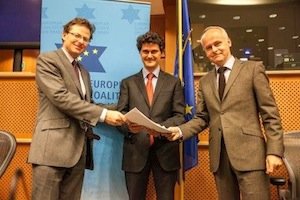
Youth Community

Aid Ukraine

Order Why Israel Resources

Support our ministry

Subscribe newsletter

Israel & Christians Today

Biblical understanding about Israel
European Coalition marks 10th Anniversary in support of Israel
In the aftermath of the 75th Anniversary of the Night of Broken Glass, a more recent anniversary was marked in the European Parliament in Brussels on Wednesday 13th November, when the European Coalition for Israel celebrated its 10th Anniversary in the EU capital. The conference “EU-Israel - Which way forward?” reviewed EU-Israeli relations since the Yom Kippur War of 1973, in the light of the proposed EU guidelines for the disputed territories. The new guidelines forbid EU grants, prizes and loans from going not just to Israeli entities located beyond the Green Line, but also to Israeli entities that have any activities beyond the post-1967 lines.
‘Europe is losing the streets in Israel,’ warned Israeli diplomat David Saranga, who spoke at the conference. ‘There is no vacuum, so if Europe continues to make life difficult for Israel, chances are that Israel will start looking in other directions for cooperation,’ he said.
ECI Legal Counsel Andrew Tucker pointed to the Yom Kippur War in 1973 as a watershed moment for EU-Israeli relations. It was then, that for the first time, the European Community formulated a common position on the Arab-Israeli conflict. They declared the disputed territories to be illegal under international law, and recognised the rights of the Palestinians to their own state within the 1949 Armistice Lines. Tucker suggested that it was the oil embargo which followed the Yom Kippur War and the threats of terrorism which were the main explanations for the sudden European change of heart and political direction.
Historian Bat Ye’or pointed to the Venice Declaration of 1980 and the Euro-Arab dialogue as a consolidation of the new European policy. This was when, for commercial reasons, the European Community aligned itself with the narrative of the Arab League. The EU guidelines are a direct consequence of these earlier policy decisions, argued Tucker and Bat Ye’or.
MEP Sari Essayah criticised the European External Action Service (EEAS) for singling out Israel and overstepping its boundaries by issuing the controversial guidelines at a time when the European Parliament was about to leave on holiday and the political institutions of Europe were closing for the summer.
‘This goes against every principle of good governance and democracy,’ she said. ‘Why did the EEAS not have any consultations with the only democratically elected institution in the EU - the European Parliament - and why is Israel singled out again, whereas other states with disputed territories, such as Morocco, are never questioned?’ she continued. Essayah also criticised the timing of the guidelines, which were issued the very same week as the US Foreign Secretary John Kerry had managed to re-start the peace talks.
The timeline of the EU guidelines has been highly criticised by another senior MEP, Elmar Brok, the Chairman of the EP Foreign Affairs Committee. In an interview with the Jerusalem Post in July, he called the timing of the issuing of the guidelines “catastrophic” and accused the EU bureaucracy of being divorced from the rest of the world. According to Brok, the guidelines can be counterproductive for Europe, since Israel is a leading nation in research and innovation. Elmar Brok spoke at the conference, where he emphasised that the new challenge for Israel is to win the media war. In other words, Israel needs to win back the streets of Europe.
The EEAS Deputy Head of Mission, Jerome Cassiers, attended the conference in order to compile a report for the High Representative of Foreign Affairs and Security Policy, Catherine Ashton, who is ultimately responsible for the guidelines. In his speech, he defended the guidelines by saying that they were not an act of legislation but had been issued on the explicit orders of the European Council (The EU Foreign Ministers) in accordance with the conclusions of their December 2012 summit. The guidelines were issued in preparation for the renewal of the next round of EU programmes, especially the 80 billion Euro flagship programme for research and innovation, Horizon 2020. Israel is the only non-EU member to be part of the programme. He defended the guidelines as being in compliance with EU policy and international law. He hoped that negotiations with the Israeli Government would lead to pragmatic solutions which will not harm EU-Israeli trade relations. But he also reiterated that the settlements are obstacles to peace.
ECI Founding Director Tomas Sandell closed the conference by stating that settlements are not obstacles to peace, but in full compliance with international law, as stated in Article 15 of the Mandate for Palestine. This states that “No discrimination shall be made between the inhabitants of Palestine on the sole grounds of race, religion or language.”
He reiterated the concerns expressed by Andrew Tucker, that Jews could be expelled from the territories promised to them in the San Remo Resolution of 1920 and the Mandate for Palestine of 1922.
‘Palestinian leader, Mahmud Abbas, has stated that there can be no Jews in a future Palestinian state, and we have not heard any protests from the High Representative,’ he noted. He went on to say that incitement to hatred is the real obstacle to peace and has to be stopped in order to achieve peace. The EU urgently needs to address this issue.
In his speech, he presented the contours of a new EU policy towards the Arab-Israeli conflict, which better reflects European values. ‘There is still only one state in the whole region of the Middle East, which shares and abides by these values, and that is Israel. It is now high time that the EU also recognises this fact, and states it publicly.’
The conference ended with Andrew Tucker and Tomas Sandell handing an Open letter to Mr. Cassiers and Mr. Brok, respectively representing the High Representative and the Foreign Affairs Committee of the European Parliament. The letter urges the EU to rescind the proposed guidelines, and urgently review the EU’s policy with regard to Palestinian statehood and the disputed territories.
The open letter which is signed by over 20 prominent European political leaders, among them government ministers, will continue to circulate throughout the month of November.
The conference was hosted by MEP Hannu Takkula and also included speeches by historian Kelvin Crombie, former Deputy Director General of the European Commission, Karel Kovanda, as well as journalist Simon Barrett.



